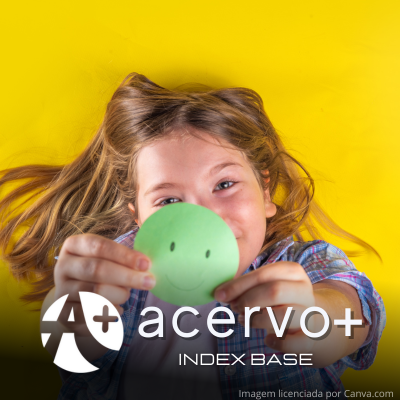Os impactos de ambientes no desenvolvimento cognitivo infantil e saúde mental
##plugins.themes.bootstrap3.article.main##
Resumo
Objetivo: Analisar a influência dos diversos ambientes no desenvolvimento cognitivo infantil e saúde mental, identificando áreas específicas de prejuízo e intervenções potenciais para apoiar o desenvolvimento saudável. Métodos: Revisão bibliográfica integrativa, a qual utilizou a base do PubMed Central (PMC), com a estratégia de pesquisa: (Environment) AND (Children) AND ((Cognitive Development) OR (Mental Health)) no período de 2023 a 2024. Após a aplicação da estratégia de pesquisa, 1426 artigos foram encontrados, e um total de 17 artigos foram selecionados para uma análise detalhada. Resultados: Estudos apontaram que a falta de segurança emocional compromete habilidades como comunicação, socialização e atenção, além de aumentar o risco de problemas como agressividade, hiperatividade e transtornos afetivos nas crianças. A interação entre pais e filhos é fundamental, com ambientes familiares acolhedores e coesos promovendo um melhor desenvolvimento linguístico e comportamental. O contexto socioeconômico desempenha um papel crucial no neurodesenvolvimento, com famílias de menor status socioeconômico apresentando resultados piores devido à falta de acesso a recursos essenciais. Considerações finais: Evidencia-se que pesquisas futuras são essenciais para aprofundar essas interações e desenvolver estratégias eficazes que garantam um desenvolvimento saudável e uma boa saúde mental em crianças de diferentes contextos.
##plugins.themes.bootstrap3.article.details##
Copyright © | Todos os direitos reservados.
A revista detém os direitos autorais exclusivos de publicação deste artigo nos termos da lei 9610/98.
Reprodução parcial
É livre o uso de partes do texto, figuras e questionário do artigo, sendo obrigatória a citação dos autores e revista.
Reprodução total
É expressamente proibida, devendo ser autorizada pela revista.
Referências
2. CARYL F, et al. Use of natural environments is associated with reduced inequalities in child mental wellbeing: A cross-sectional analysis using global positioning system (GPS) data. Environment international, 2024; 190: 108847.
3. GEBRU NM, et al. Effects of parental mental health and family environment on impulsivity in preadolescents: a longitudinal ABCD study. Behavioral Neuroscience, 2023; 1: 1-10.
4. GONZÁLES L, et al. Socioeconomic position, family context, and child cognitive development. European Journal of Pediatrics, 2024; 183: 2571–2585.
5. GOODMAN NT, et al. Green Space and Internalizing or Externalizing Symptoms Among Children. Jama Network Open, 2024; 7(4): 245742.
6. HOREN NM, et al. Infant and Early Childhood Mental Health (IECMH) and Early Childhood Intervention: Intentional Integration. International Journal of Environmental Research an Public Health, 2024; 21: 870.
7. JEONG HJ, et al. Early life stress and functional network topology in children. Developmental Cognitive Neuroscience, 2024; 66: 101367.
8. LATINO F e TAFURI F. Physical Activity and Cognitive Functioning. Medicina, 2024; 60(2): 216.
9. LOMAX T, et al. Effect of nature on the mental health and well-being of children and adolescents: meta-review. The British Journal of Psychiatry, 2024.
10. MCDERMOTT CL, et al. Sensitivity to psychosocial influences at age 3 predicts mental health in middle childhood. Developmental Science Wiley, 2024; 27: 13531.
11. PAIVA GCC, et al. Parent training for disruptive behavior symptoms in attention deficit hyperactivity disorder: a randomized clinical trial. Frontiers in Psychology, 2024; 10.3389/fpsyg.2024.1293244.
12. PÉREZ SM, et al. Social inequalities, grenn and blue spaces and mental health in 6-12 years old children participating in the INMA cohort. Journal Health and Place, 2023, 1: 1-12.
13. REN Z, et al. Adverse childhood experiences from family and society contribute to increased risk of depressive symptoms and cognitive impairment: a cross- sectional study. General Psychiatry, 2023; 36: 101039.
14. RUNZE, J. et al. The polygenic and reactive nature of observed parenting. Genes, brain, and behavior, 2023; 22(6).
15. SHENNON I, et al. The infant gut microbiome and cognitive development in malnutrition. Clinical Nutrition. 2024; 43: 1181-1189.
16. STOLPER H, et al. The integrated family approach in mental health care services: a study of risk factors. International Journal of Environmental Research and Public Health, 2024; 21: 640.
17. TRESPALACIOS F, et al. The perceived social support of parentes having bipolar disorder impacts their children’s mental health: a 10-year longitudinal study. Springer, 2024; 12(27): 2-13.
18. VAN HOUTUM e LAEM. Running in the FAMILY: understanding and predicting the intergenerational transmission of mental illness. European Child & Adolescent Psychiatry, 2024; 1-14.
19. VISWANATHAN P, et al. Individual and environmental factors in internalizing disorders in children and adolescents. Clinical Child Psychology and Psychiatry, 2024; 29(2): 424-438.
20. VOLKOW ND, et al. The Healthy Brain and Child Development Study (HBCD): NIH collaboration to understand the impacts of prenatal and early life experiences on brain development. Developmental Cognitive Neuroscience, 2024; 69: 101423.
21. WANG Y. Influence of Early Family Nurturing Environment on Children’s Psychological and Emotional Social Development. Iranian Journal of Public Health, 2023; 52(10): 2138.
22. XIAO Y, et al. Patterns of Social Determinants of Health and Child Mental Health, Cognition, and Physical Health. JAMA Pediatr, 2023; 177(12): 1294-1305.

